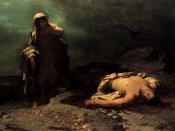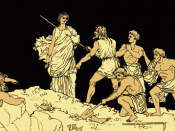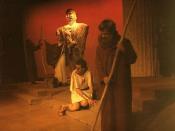In the play "Antigone" by Sophocles, there is a main conflict as to who is wrong and who is right in the death of Antigone's brother, Polyneices. After he died, Antigone tried to bury him, much to the disliking of the king, Creon, because he had forbidden it. Creon had deemed Polyneices a traitor. As the story unfolds, though, the reader will come to realize that Creon is the one who is wrong by making his royal word to be against the laws of the Gods. Creon is a powerful ruler but was too proud of his wisdom.
After the death of her brother, Antigone is caught spreading dirt on Polyneices, making any effort to bury him, trying to give him a proper burial. The guards tell Creon this and he is angered greatly to the point where he blames the guard and sentences him to death. He has no idea who really did it and is worried that people will think he is not powerful if word gets out that this happened.
He later finds Antigone and talks to her about her crime. She gives good points to Creon telling him how Polyneices deserved a proper burial, no matter what crime he committed, and by reminding him of the Gods' divine laws. Creon sentenced her to be buried alive, even though she was betrothed to his son, Haemon. Haemon reacts to this by having a feud with his father and leaving his home.
When the blind prophet, Teiresias, tells Creon that the Gods are on Antigone's side, Creon realizes that he probably should not have given such a terrible death to Antigone and a death without a burial to Polynices. Unfortunately, though, it was too late to change his mind because when he came to bury Polynices in the tomb, Antigone had killed herself in her sadness.
After another confrontation with Creon, Haemon kills himself. When Creon returns to the palace, he finds his wife, Eurydice, dead. That is four of his family, dead, all because of one very wrong decision. This all could have been avoided if Creon had let a burial take place for Polynices. It almost sounds disgusting, just letting a body rot without a burial. If he understood how Antigone felt he might have changed his mind.
If you can put yourself in Antigone's position, imagine one of your loved ones dying. Imagine another of your loved ones telling you not to bury him or else you will be put to death. Would you make the same decision that Antigone did? What about Haemon? How must he have felt when his father told him that he was going to kill his soon-to-be bride? In addition, Eurydice suffered the same as Antigone and Haemon as she had to watch this go on. In the end, though, Creon is alone, which is a harsh punishment for a wrong decision. However, as a king, you have to make hard decisions all the time, just as the President does. When it comes down to death, though, everyone should have a proper burial.
You know that people die everyday, many people. Most of them can afford proper burials and some of them cannot. Even ex-convicts get proper burials because they still have people that care about them. Creon was so proud of his wisdom that it leads him to do something very horrible. You cannot just let a body sit and rot, especially if it a family member of yours or it means something to someone else. We can understand now why the deaths of Antigone, Haemon, and Eurydice all happened in sequence. They were all saddened by a loss so they decided to take their own lives.
The main point that I am stressing on, is that Creon made a bad decision, but paid a terrible price for it. A bad decision can come back to haunt you as he found out. Creon should have taken into consideration that people suffer from things as horrible as death. People that survive the dead are left to mourn, and the least he could do was let them have a proper burial, regardless of the crime that Polyneices committed. Antigone was right by trying to bury her brother. Haemon was right for arguing with his father about Antigone. Creon was wrong and now we can say that he learned a valuable lesson from all this.





